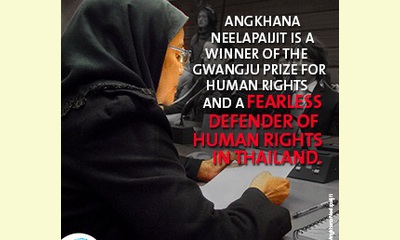|
|
Angkhana Neelapaijit: A crusader of human rights and dignity in Thailand
un articulo por UN Women
Angkhana Neelapaijit had imagined a life much
different from the one she has today. The sudden
disappearance of her husband, Somchai
Neelapaijit, a human rights lawyer, changed the
course of her life and took her on a path she had
never thought she would travel. From a
homemaker looking after her husband and five
children, she turned into a fearless defender of
human rights, working tirelessly to bring back her
husband, and supported many others whose
rights were violated. 
click on photo to enlarge
Winner of the Gwangju Prize for Human Rights,
recognizing those who have contributed to
advancing human rights, democracy and peace,
Angkhana Neelapaijit was also honoured by the
National Human Rights Commission of Thailand.
Angkhana Neelapaijit was placed under the
government’s witness protection programme
following her husband’s disappearance in 2004,
and has received multiple death threats for both
her own and her husband’s representation of
controversial legal cases. In spite of the turbulent
political landscape in Thailand, she has not been
deterred from championing human rights cases
including alleged rape of young girls by soldiers,
forced and child marriages and disappearances of
people of multiple ethnicities and religions during
governmental coups.
Neelapaijit is the Chairwoman for the Justice for
Peace Foundation, and has been termed "a
leading human rights defender in Southern
Thailand," by Amnesty International. Neelapaijit
story was the subject of the reputed documentary
‘Unjust,’ in 2011, and the film was given a Special
Jury Award at The Hague's Movies that Matter
Festival.
Is the fact that you are a woman part of what
has allowed you to achieve all that you have
accomplished?
Yes, as a woman it makes it easy for me to talk
with people. I can build alliances and create
channels to give voice to the voiceless. I have
spoken to hundreds of survivors of human rights
abuses and organized support for families in
despair. Never having lost hope in the political and
judicial system, I have worked with stakeholders
across all sectors to influence changes and
structural transformation to ensure Thailand lives
up to its promises and obligations.
What were some of the greatest obstacles you
had to face to get where you are today?
Like anywhere else for those who work to promote
human rights, I have often been challenged by
unknown people about my work for human rights
and rights of women left behind. As a Muslim
woman who works on women’s rights issues,
personal security is my concern.
Tell us a bit about your childhood, your
ambitions and who inspired you to be who you are
now?
I was born into a Muslim family in Bangkok.
Despite growing up poor, my parents placed a
high value on education and sent me and my
sisters to good primary and secondary schools,
leading me to receive a scholarship from Mahidol
University to study for my nursing degree in 1976.
(Thank you to Janet Hudgins, the CPNN
reporter for this article.)
(This article is continued in the discussionboard)
|








|
DISCUSSION
No hay pregunta ligada a este article.
* * * * *
Comentario más reciente:
:
(The following is continued from the main article listed above.)
In October 1976, I was a witness to the Thammasat University Massacre, or Massacre of 6 October 1976. Students were protesting against the return to Thailand of former dictator Field Marshal Thanom Kittikachorn. This caused the death of numerous students and triggered their flight into the jungle - students whose commitment and strength have continuously inspired me to work on human rights, justice and peace.
What do you believe is your greatest contribution to society and your community?
I believe that it is absolutely necessary to combine the local level work with the national, regional and international level. I make the connections between the work with individual survivors and their families to the UN and government agencies. I can bring the painful stories from the ground to the national level and the United Nations High Commissioner for Human Rights.
What is your message for other women and girls who might be inspired by your journey?
I want to say that actually, most women experience conflict and violence in a different way than most men. They also develop unique skills and expertise for resisting, addressing and preventing conflict. Work on justice and peace cannot afford to neglect constructive contributions of women. You should not lose hope and always be strong and courageous to make changes.

|
|









